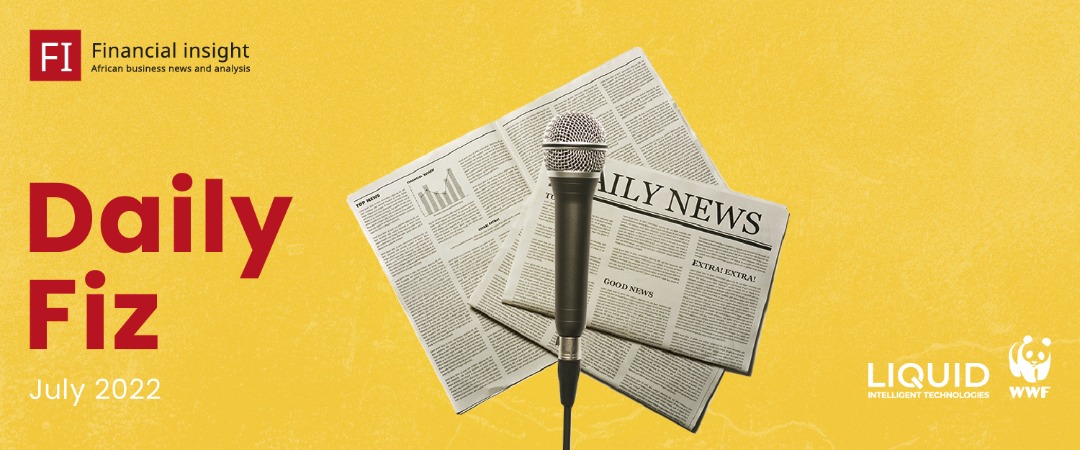Good morning. Here’s what you need to know to start your day.
-
President Hakainde Hichilema has concluded his five-day tour of the Copperbelt with a pledge to improve the region’s agriculture and infrastructure development.
-
By multiplying the heavy infrastructure projects in Africa, China, and Russia aim to establish their influence in the countries of the continent, which risk their part to find themselves “trapped”, warn experts.
-
Puma Energy Zambia Plc recorded a profit after tax of K231.51 million compared to K86.08 million recorded in the previous financial year.
Story of the Day
Recently, the term state capture has been popularized in the advent of a visible Zambian private sector in the presence of fiscal. Although the phrase reminds many of sagas closer to home such as the Guptas of South Africa, it is important to put context to the subject matter. A quick google search for the phrase defines it as “a type of systemic political corruption in which private interests significantly influence a state’s decision-making processes to their own advantage”. A history check further reveals that the term was first used by the World bank in the 2000s when they were describing the situation in a certain Central Asian country that was making its transition from Soviet communism. Zambia has been in the Western and subtly Eastern lime light in so far as issues around the country being open for business, debt destress resolutions, and a return to “an enabling environment”. Without a doubt, the roadshows (majority to the west) by fiscal have definitely pointed the investment spotlight on Zambia. However, there is also a voice that has now started to amplify itself in light of the “open door” policy. This is the voice of local Zambia businesses, many of which have been extant players in various industries. Read more
In Local Business News Sponsored by

President Hakainde Hichilema has concluded his five-day tour of the Copperbelt with a pledge to improve the region’s agriculture and infrastructure development. President Hichilema said when he addressed a meeting in Lufwanyama on Thursday that it was disappointing that despite the remote town having good soils ,agriculture had not been developed to acceptable levels. “This area has good soils, it is supposed to be the bread basket of the country. My government is committed to supporting farmers with inputs and irrigation facilities to boost farmers contributions to the country’s economy,” he said. He also said his government was looking on upgrading the Kalengwa road to link the town to Kasempa in North Western province and Mumbwa and Kaoma in Central and Western provinces. The President declared that this year would be dedicated to engaging the grassroots and party support as well as use the engagement to get their economic and social needs. Read more: Zambia Monitor
The government has expressed concern with the low levels of labour productivity growth in the country. Ministry of Labour and Social Security Acting Permanent Secretary, Zechariah Luhanga, said labour productivity in Zambia contracted by 21 percent between 2019 and 2020. Mr Luhanga said the Zambia Productivity Report indicated that only five industries registered positive growth in labour productivity. These industries are electricity, mining and quarrying, water supply, sewerage and waste management, real estate and information and communication. Read more: Lusaka Times
The Technology and Science Minister of Zambia, Felix Mutati, recently announced the government’s plan to erect 300 phone network towers across the country to enhance internet and mobile phone services. The minister stated that the government’s vision is to ensure that every region in the country has access to mobile phone services and good connectivity to the internet. The move to erect additional phone network towers is a crucial step towards achieving the government’s goal of improving the quality of communication services in the country. Zambia is a country with a population of over 18 million, and ensuring that every citizen has access to reliable communication services is essential for the country’s economic growth and development. Read more: Lusaka Times
Zimbabwe and Zambia are set to conclude an agreement which is expected to foster transnational co-operation in ecosystems management through the establishment, development and management of the Lower Zambezi Mana Pools Transfrontier Conservation Area (LOZAMAP TFCA). The TFCA development plan will be funded by the Global Environmental Facility 6. Speaking at yesterday’s post-Cabinet briefing, Acting Information, Publicity and Broadcasting Services Minister Jenfan Muswere said the MoU on the LOZAMAP TFCA had been approved by Cabinet and its finalisation would make way for the two countries to start implementing initiatives for the development of the area. Read more: Zimbabwe Chronicle
In International Business News Sponsored By KPMG

By multiplying the heavy infrastructure projects in Africa, China, and Russia aim to establish their influence in the countries of the continent, which risk their part to find themselves “trapped”, warn experts. Railway lines, and civil infrastructure: China is multiplying gigantic projects in cooperation with African states, of which it is becoming one of the main donors. “One in three major infrastructure projects in Africa is built by Chinese state-owned companies, one in five is financed by a Chinese institutional bank,” says Paul Nantulya, of the Africa Center for Strategic Studies, who report of the US Department of Defense. Beijing is taking advantage of the void left by the withdrawal of Western countries, which are more hesitant to finance these projects. “The Chinese saw this void and decided to invest in infrastructure,” remarks Mr. Nantulya. Read more: Africa News
After analyzing the results of more than 1,200 companies, Jeune Afrique unveils its exclusive ranking of the 500 most important companies in Africa. Hit by the Covid pandemic and then by the repercussions of the war in Ukraine, companies on the continent have to deal with an ever-uncertain business environment, synonymous with both pitfalls and opportunities. In fact, some players have succeeded in getting out of the game thanks in particular to the innovation strategies deployed to adapt to the multiplication of exogenous shocks. Jeune Afrique draws up a ranking, of the 500 companies on the continent that have best-taken advantage of opportunities in the 2021 financial year. A ranking that reaches the third-highest level of overall turnover since the launch of this type of investigation. Read more: Africa News
Treasury Secretary Janet Yellen said Thursday that China would be among the first in line to get paid under a Republican proposal to prioritize some U.S. debt obligations over others, calling it a “dangerous idea” that would technically cause the U.S. to default on its bonds. House Republicans are holding up a bill to raise the U.S. debt ceiling, which hit its $31.4 trillion borrowing limit in January. They want any agreement on the debt limit to be paired with spending cuts on social programs. Their latest debt ceiling proposal, which passed 21-17 out of the House Ways and Means Committee last week, would prioritize which payments the U.S. Treasury makes first when the U.S. hits the ceiling at which it cannot issue more bonds. Read more: CNBC
Banks sought record amounts of emergency liquidity from the Federal Reserve over recent days in the wake of the failure of Silicon Valley Bank and Signature Bank, which in turn helped undo months of central bank efforts to shrink the size of its balance sheet, Fed data showed on Thursday. Banks took an all-time high $152.9 billion from the Fed’s traditional lender-of-last resort facility known as the discount window as of Wednesday, while also taking $11.9 billion in loans from the Fed’s newly created Bank Term Lending Program. The discount window jump crashed through the prior record of $112 billion in the fall of 2008, during the most acute phase of the financial crisis. Read more: Reuters
Finally, Capital Markets News
In compliance with the Securities Act No. 41 of 2016 of the Laws of Zambia and the Listing Requirements of the Lusaka Securities Exchange, Puma Energy Zambia Plc announces the audited results for the year ended 31 December 2022. For the year ended 31 December 2022, the Company recorded a profit after tax of K231.51 million compared to K86.08 million recorded in the previous financial year. Volumes were 9% higher than those achieved in the year ended 31 December 2021. A profit before finance costs, taxation and exchange gains of K331.99 million was achieved for the year ended 31 December 2022 compared to K197.53 million for the previous year, while the pre- tax profit was K325.90 million compared to K140.18 million the previous year. Read more
In 104 trades recorded yesterday, 16,465,074 shares were transacted resulting in a turnover of K71,553,192.92. A Share price gain of K0.08 was recorded in ZAMEFA and a share price loss of K0.01 was recorded in PUMA. Trading activity was also recorded in CEC Zambia, Chilanga Cement, Standard Chartered Bank Limited, Zambeef, Zanaco, and Zambia Sugar. The LuSE All Share Index (LASI) closed at 7,326.09 points 0.01% down from its previous close of 7,326.74. The market closed on a capitalization of K72,820,821,909.89 including Shoprite Holdings and K38,038,136,469.89 excluding Shoprite Holdings.
Picture of the Day









